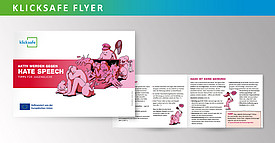The limits of freedom of expressionNew brochure for educators on hate speech online

Hateful comments, insults or even specific threats of violence can now be found in many places on the internet. For example, on social media channels, in forums and in the comment sections of online media. 76% of internet users have already come into contact with hate speech. This is shown by the results of the Hate Speech forsa survey conducted by the NRW Media Authority (2023).
Hate speech differs from other forms of digital violence (such as cyberbullying). It is primarily directed against people who belong to marginalized groups. And it devalues people based on their appearance, origin, religion or sexual orientation, for example.
Hate speech does not emerge in a vacuum, but is based on existing structures of power and discrimination. Extremist groups in particular use the internet specifically for their hateful propaganda and benefit from the supposed anonymity.
As a general rule, no one should have to fear violence. Neither in private nor in public. Countering inhuman, racist or hateful voices is therefore a task for society as a whole - offline and online.
Our new brochure helps you to identify hate speech in its more subtle forms and to develop options for action to effectively counter misanthropic statements online and offline.
The brochure is primarily aimed at professionals and provides specific tips for (media education) work with young people.
How can those affected and vigilant users react when they encounter hate speech online?
- Report it: If the hate comment is directed at you personally, the first step should be for those affected tocontact the platform (e.g. Facebook, Instagram, TikTok) and ask them to delete the comment. However, people who are not affected themselves can also report comments. www.internet-beschwerdestelle.de and jugendschutz.net also accept complaints.
- Take legal action: The authors of hate messages can be prosecuted under both civil and criminallaw. In the case of serious hate comments, a criminal complaint can be filed. The police and the public prosecutor's office are responsible. There is also the option of anonymous and online reporting.
- Reporting insults: In the case of insults under Section 185 of the Criminal Code, the police and public prosecutor's office only investigate after a complaint has been made. In this case, it is not sufficient for the police themselves to become aware of a possible criminal offense.
- Secure evidence: It is particularly important to secure the evidence properly when filing a complaint. All relevant data should be saved using screenshots. It is also helpful to document the context. A screenshot should not only include the offensive message, but also the previous chat history, for example. This helps to better prove the seriousness of an offense. This klicksafe checklist helps to preserve evidence.







